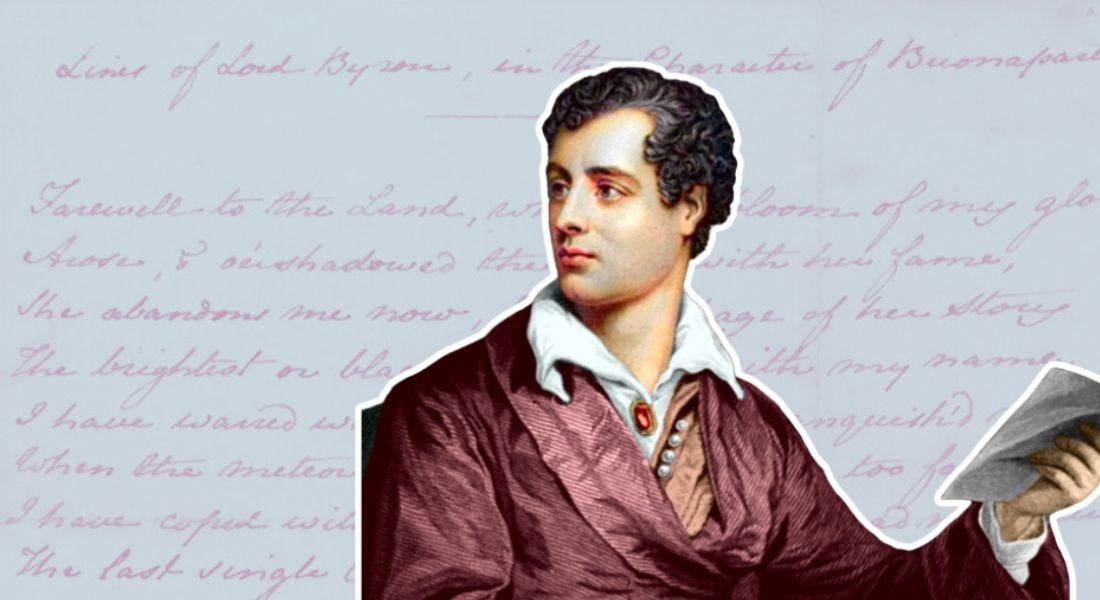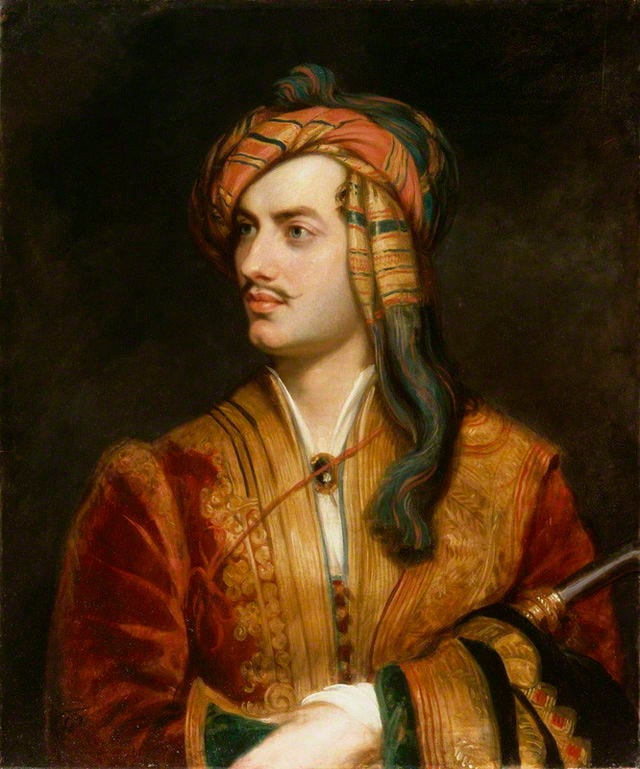Lord Byron — his remarkable history and lasting legacy
Ahead of the 200th anniversary of his death, we explore the impact of Nottingham's famous Romantic poet
The history of Lord Byron is entwined in not just the spirit of our rebellious county, but of people all over the world.
In commemoration of the 200th anniversary of his death on April 19 2024, we’ve take a look back at everything he did to create change and the impact his words and actions still have today.
From his writing as a pioneering romantic poet to his fighting spirit against society, there are plenty of reasons to celebrate the life of Lord Byron.
“He will forever be a reminder to embrace individuality and question authority” — Lord Byron’s history and legacy
By Ashley Carter
The attempt to comprehend the legacy of George Gordon Byron — more commonly known simply as Lord Byron — remains as complicated at the bicentennial of his death as the man himself was during life.
Drawing his final breath on the shores of Missonlonghi, Greece, 200 years ago, Byron had filled his 36 years with enough chaos, scandal, individualism, passion and adventure to fill a dozen lifetimes, leaving countless scholars, historians and fans at a loss in trying to understand who the real Lord Byron truly was.

Writing a legacy
In literary circles, he’s the quintessential Romantic poet whose work spanned poetry, drama and prose, exerting a profound influence on writers, artists and thinkers in the two centuries since. Through works like Don Juan, The Corsair and The Vampyre, he created the Byronic hero — perhaps his most enduring contributions to literature.
Brooding, gloomy, morally ambiguous and haunted by inner turmoil, the Byronic hero became an integral archetype, counting the likes of Batman, Han Solo and Professor Snape among its ranks.
His pioneering exploration of themes such as loss, love, nature and the sublime resonated with readers across cultures and continents, creating in Byron one of the world’s first true global superstars.
But, his legacy stretches far beyond the written word.
Fighting for Greece
Walk through the streets of Athens today and you’ll find that Lord Byron cuts the figure of a dashing freedom fighter who gladly laid his life down for the cause of Greek independence. The countless statues carved in his image and the cafes, hotels, bars and streets named in his honour showcase the enduring love and respect the nation has for its foreign-born hero.
His deep-rooted desire for adventure, commitment to independence in all its forms and love for the country he travelled as a younger man (his carved signature is still visible in some ancient monuments) saw him spend £4,000 of his own money — around half a million pounds today — to prepare a fleet for service in the war against the Ottoman Empire.
However, the terrible conditions of the campaign would eventually catch up to the hard-living Byron, and malaria would take his life in Greece. “Die I must. Its loss I do not lament; for to terminate my wearisome existence I came to Greece,” Byron wrote on his deathbed. “My wealth, my abilities, I devoted to her cause. Well, there is my life to her.”
Being a true Notts spirit
But what of Byron’s reputation in his hometown? Forming part of the city’s literary triumvirate with Alan Sillitoe and D.H. Lawrence, Byron’s legacy forms part of Nottingham’s cultural fabric.
Yes, we celebrate his words and his actions, both at home and abroad, but there’s something about his essence that connects so perfectly with a city that also strives for independence and freedom at every opportunity.
From the mad young boy who kept a pet bear as a student at Trinity College to the ferociously individual adult who imitated the mythological feats of his beloved Greek heroes by swimming the Hellespont, Byron was a man whose exploits screamed at the incompatibility of his soul to the world around him.
Rebelling against society
Incessantly challenging the social constraints that threatened to enslave him to a life of drab routine and duty, he thrashed against societal norms and asserted his uncompromising commitment to individualism.
He championed freedom of expression and the rights of the individual to love and live according to their own wants and desires, regardless of the personal cost.
Walking that particular road was not without its perils, and by daring to defy convention, his life was plagued by intense scrutiny. A tumultuous love life filled with incidents of infidelity, abuse, and even rumoured incest, Byron’s legacy remains as much the rakish libertine as it does the talented writer.
Having a lasting impact
In an age marked by conformity and complacency, Byron's legacy serves as a reminder of the power of art — and the artist — to provoke, to challenge, and to transform. His words and deeds continue to resonate with readers of all ages, inviting us to explore the depths of our humanity and to confront the extremes of the human experience.
As the 200th anniversary of his death arrives, the conversation about the enduring legacy of Lord Byron shouldn’t be discussed in the past tense, but rather the present: it isn’t what he was, but what he continues to be.
Byron will forever be a reminder to embrace individuality, question authority, strive for absolute creative freedom and dedicate yourself entirely to the thing that truly ignites your soul.




